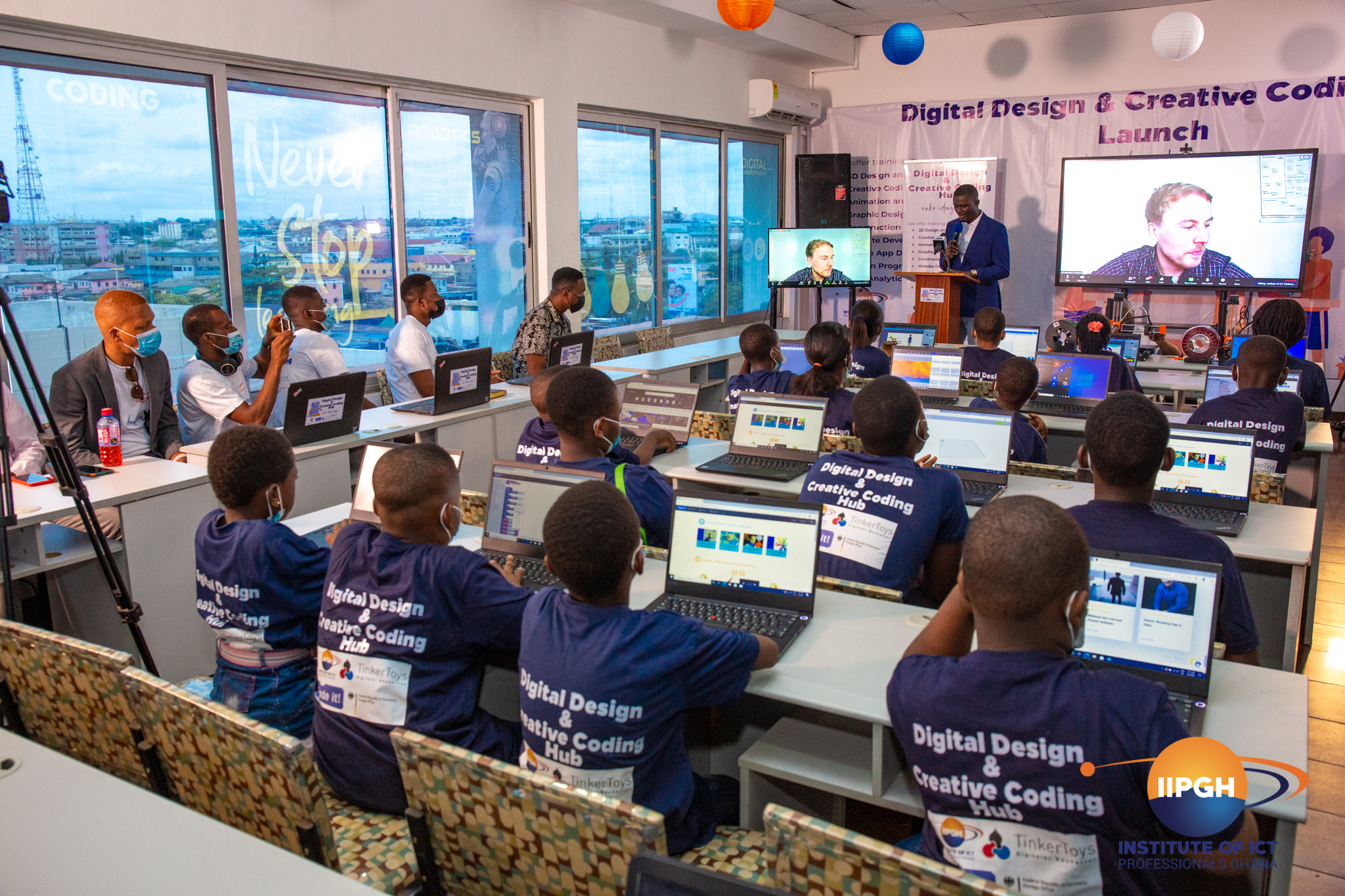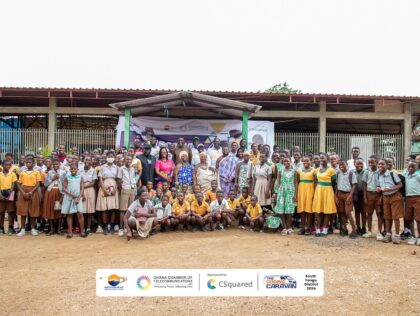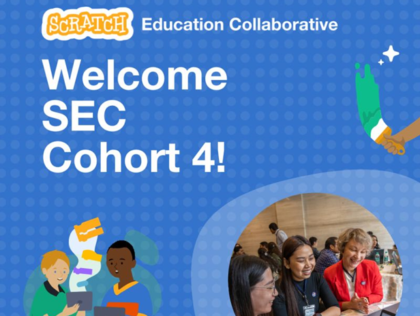The Institute of ICT Professionals Ghana (IIPGH) with its partners Codie it!, and TinkerToys, from Leipzig, Germany on 3rd May 2021 successfully launched its Digital Design and Creative Coding Hub in Accra.
The event had a splendid setup, hosting about 35 children with their parents, and other invited guests. The launch was live on zoom and on Facebook, which saw over 300 participants connecting across the country and beyond. At the launch were dignitaries including Hon. Kwaku Ampratwum-Sarpong, Deputy Minister-Designate for Foreign Affairs and Regional Integration, MP-Mampong; Prof. Fred McBagonluri, President Academic City University College, Board Chair Institute of ICT Professionals Ghana; Mr. Ronny Zienert, Head of Unit, Saxon State, Ministry for Regional Development, International Cooperation, Germany; Dr. Peter Kettner, Ministry of Foreign Affairs, Germany; Mr. Prince Sefa, Deputy Director-General Operations, National Communications Authority (NCA), Board Member of Institute of ICT Professionals Ghana; and Hanna Schlingmann, AFOS Foundation for Entrepreneurial Development Cooperation.
Summary
The “Digital Design and Creative Coding Hub” is meant to be a showroom for tools and concepts for digital learning and creative work–for innovative and creative projects and a center for national and international exchange. The tools and concepts will be accessible to everybody who is interested and will be taught through training and other events to educators and multipliers. The project is supported by the “Creative Resources” program of the German Federal Foreign Office.
Background
The new digital revolution presents amazing prospects. Emerging technologies such as 5G, robotics, artificial intelligence, Internet of things (IoT), big data, cloud computing, mobile applications, and 3D printing, offer enormous opportunities to improve societies.
However, every revolution comes with its challenges. One is the emerging skill gap. New technologies are disrupting industries and changing how we work and socialize. For people without digital skills, it is getting harder to thrive in the workplace irrespective of their chosen career. Thus, there is an urgent need to learn new skills ranging from basic to advanced digital know-how.
To address this skill gap, we need to tackle several challenges associated with the development of digitally literate society and a digital economy. The challenges include affordability, scalability, and sustainability of training; lack of qualified instructors; lack of infrastructure; relevant curriculum, etc. It is also crucial to look at issues of inequalities associated with gender, geographical location, and persons with special needs.
The idea of creating a Digital Design and Creative Coding Hub is to tackle those challenges, to improve digital literacy in Ghana, and to instigate an international knowledge transfer. In Ghana, there is currently a great need and interest in digital tools and new technologies, for art production, for education, for the development of new business models, and for the development of new markets.
To make digital skills like coding and digital design available to everybody, access to digital tools and new approaches to teaching and learning are needed. In Ghana, the digitization of education is still in its early stages. There is a lack of technical infrastructure – Internet access and hardware, effective pedagogical concepts, and qualified teachers. For such reason, the hub will be a showroom in which all who are interested can get to know and try out digital tools (hardware and software) and learn how to use them in schools, for creative projects, or in business contexts.
Why learn about coding and digital design?
In our digitized world, coding is becoming an integral part of literacy. To understand and change our digital world, which is increasingly determined by algorithms, one needs at least basic programming skills. Learning to program is no longer just for computer specialists and software developers. In more and more countries, programming is becoming a mandatory part of school education, and in professions and social fields, programming skills are becoming a prerequisite.
Creative coding is the artisan side of programming. In creative coding, computer programming is used to create something expressive instead of something functional. Focusing strongly on creating interactive experiences in creative coding, the program moves past the sequential problem solving found in typical beginner programming and coding courses. In this field of coding, artists, designers, and creatives apply programming concepts to work in a variety of media, such as 2D/3D graphics, animation, image, sound, and video processing. Thus, in our world of digital applications, design is now more relevant than ever before. Digital design is a type of visual communication that presents information or a product or service through a digital interface.
Implementation of the project
The hub is equipped with basic technical infrastructure. That includes notebooks, a smartboard, and a 3D printer, with the digital creative tools of the German project partners, Code it! and TinkerToys, available to all interested educators and artists. The technical equipment of the hub (hardware and software) is to be continuously expanded in the future by winning new partners and sponsors for the project.
The focus of the Hub is on the field of design and art.
Code it! and TinkerToys software is a learning platform and digital construction kit (respectively) for learning programming, and teaching children and beginners the basic concepts of programming in a simple and practical way. This allows children to create their own 3D designs easily and intuitively – e.g., robots, own game figures, houses, cars, cities, flying objects, etc.
In addition to operating the showroom as a focal point, regular training courses and other events such as lectures and discussions on various topics will be organized. In those events, approaches, and tools from the fields of education, coding, and design will be presented. The hub is intended to initiate and promote the national and international exchange of knowledge and experience between educators and creative professionals. New partners and sponsors from Ghana, Europe, and other parts of the world are to be won for the long-term operation of the hub.
Goals and Objectives
The hub shall promote the permanent exhibition of technologies and digital products. It shall provide training and workshops for teachers, ICT trainers, and young people, exposing them to emerging technologies; provide a maker space and an innovation lab for young people; organize events like hackathons, data challenges, and competitions; as well as enable knowledge transfer and promote national/international cooperation. In addition, the hub shall assist educational institutions at all levels to strengthen ICT training; contribute to closing the digital gender gap and strive for inclusiveness and digital equality for women and the disadvantaged; and consult for educational and governmental institutions on emerging technologies, digital education, and digital skills development policies.
Sustainability
To ensure the long-term work of the Hub, financial resources shall be generated to sustain operations by providing several professional services to the public. Services include affordable training workshops and lectures for teachers and ICT trainers, children, and all interested participants. The 3D printers shall create prototypes for artists, engineers, architects, etc. at appropriate fees.
The Hub welcomes partnerships with other organizations to develop proposals and respond to request for proposals that will bring projects to the Hub.
Author: Richard Kafui Amanfu– (Director of Operations, Institute of ICT Professionals, Ghana)
For comments, contact richard.amanfu@iipgh.org or Mobile: +233244357006







